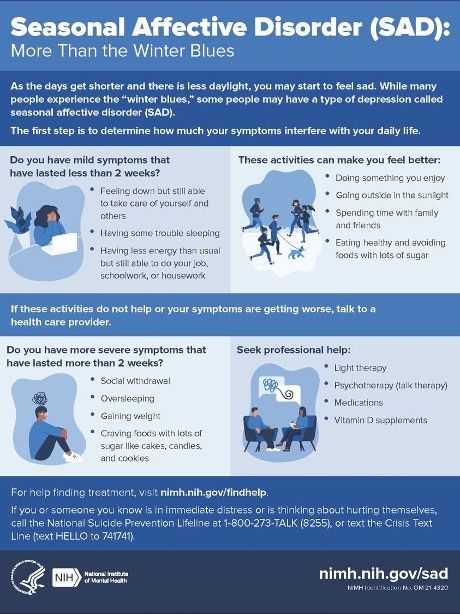By Marine Saint, Features Columnist and Subeditor
As the winter season emerges, Epigram outlines the ins and outs of Seasonal Affective Disorder (SAD) and how the experts suggest to tackle it.
With the daylight hours shortening, temperatures dropping and work intensifying as we make our way through what has been a hectic first term of the university year, it is important to check in on our mental health. It is incredibly common for students to experience seasonal affective disorder (SAD) as an accumulation of the stresses which occur at this time, a type of depression defined by the NHS as one that comes and goes in a seasonal pattern. It is often known as ‘winter depression’ as symptoms are typically heightened during winter.
The mental health charity Mind outlines how symptoms have a large impact on the day-to-day lives of those who struggle with SAD and highlight the need to de-stigmatise open discussions regarding the severity of mental health issues. Symptoms and signs vary depending on the individual, but include: lack of energy, finding it hard to concentrate, not wanting to see people, sleep problems and changes to your sleep schedule, feeling sad, low, tearful, guilty or hopeless, changes in your appetite, being more prone to physical health problems, such as colds, infections or other illnesses, losing interest in sex or physical contact, and suicidal feelings. For students, there is an evident correlation between these troubles and academic stress, loss of motivation, and loneliness or anxiety in social situations.
The cause of seasonal affective disorder is believed to be due to the reduced exposure to sunlight during shorter days of the autumn and winter season, resulting in lower serotonin hormone levels and higher melatonin (a hormone which stimulates fatigue) levels. Mind and the NHS recommend lifestyle changes to maximise access to natural sunlight, using a lightbox to stimulate exposure to light, talking therapies (download the student health app to book into counselling or to seek further advice), and arts and creative therapies. If you yourself are not personally experiencing SAD, but wish to support any friends, housemates, or relatives, it is key to support them seeking help, planning ahead so they can work on their self-care, and be informed in the ways to talk with them about their worries openly and encouragingly.

Mental health support whilst at university has always been a contentious issue, often due to the limited advertising of help schemes and where to seek assistance on campus. In addition to signing up to the student health app to receive university counselling or NHS support, the University of Bristol website offers an online being well, living well toolkit with professional advice, and mental wellbeing and academic support workshops in November and December to help students experiencing problems with loneliness, self-esteem, and any other mental health struggles. Not all students have access to the network of support which housemates, friends, and family can provide, so make sure to seek out internal help or maximise the external resources available.
The university suggests apps such as Headspace, to help you meditate, SAM to manage anxiety, and Talk Campus which enables users to share their feelings with students across the world at any time. If you wish to speak to someone directly about your worries, call Nightline anytime on 01179 266 266 between 8pm and 8am for a non-advisory listening service, complete the Support Request Form online or call +44 (0)117 456 9860 so that the university Wellbeing Advisors can find the right support for you.
In light of the recent world mental health day on 10th October, Epigram asked students how they felt the university was supporting them. One second year student expressed how ‘A lot of people I know really felt the impact of seasonal affective disorder last year due to the isolating process of lockdown over Christmas. The stress of exams around this period, as well as the shorter days definitely makes students feel less motivated, and the frequent reluctance of the university to acknowledge this as an extenuating circumstance is something they could work on improving.’
In terms of student-led support, the Student Union Wellbeing Network is available for all students to join. According to their website, it was created ‘to ensure that our wellbeing needs, as students, are being met by the policies, services and culture at university. We bring together students, societies, university staff and external partners to: raise awareness of different aspects of student life that affect mental health and wellbeing; organise events that are beneficial to wellbeing; give voice to students with lived experience of the policies, services and culture at university, and campaign for better support for all students with differing needs.’
‘A lot of people I know really felt the impact of seasonal affective disorder last year due to the isolating process of lockdown over Christmas.'
The confidence to talk about the impact of seasonal affective disorder and other stresses which coincide with end of term deadlines can seem very daunting, but one way to find a support network could be through the SU’s university-wide Buddy Scheme, which is already made up of over 400 students. This time of year can be particularly isolating, so it is important to occupy ourselves with non-academic activities, such as joining one of the many university sports societies, picking up a new hobby, or trying out some of the wellbeing activities and events hosted by students’ peer support groups or clubs.
Another significant way in which students are actively engaging in mental health discourses is through the yearly Movember campaign. The related Bristol University website displays a tracker of money raised with an impressive £60,000 target and leader board of top individuals and teams (including 25 predominantly men’s sports teams). As well as donations and events, challenges such as ‘move for Movember’ in which participants commit to running 60km for the 60 men lost to suicide every hour across the hour demonstrate how pertinent issues of mental health are and how it is vital to find ways to tackle anxiety and the right support to feel comfortable and valid when opening up about struggles which so many students have previously faced alone.
'the frequent reluctance of the university to acknowledge this as an extenuating circumstance is something they could work on improving.’
Seasonal depression has appeared as an unspoken part of university life for a lot of students, and now as term gets busier and deadlines approach, it is more important than ever to check in on friends, family, and yourself.
Featured Image: Epigram | Edward Deacon









